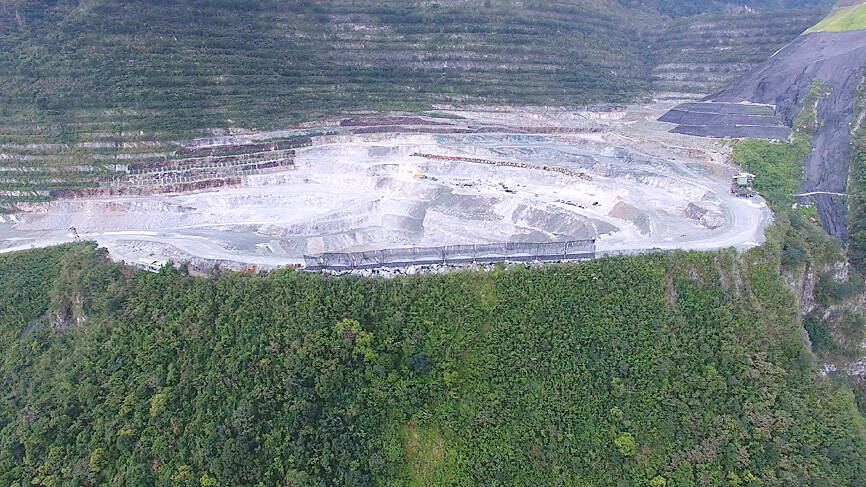Amendments to the Mining Act (礦業法) that would give more say to indigenous communities regarding mining rights in their lands passed the legislature on Friday.
The changes cleared the legislative floor without opposition after more than six years of efforts by lawmakers and environmentalists.
They require mining companies to obtain the consent of local indigenous people before launching projects on designated indigenous lands, in accordance with the Indigenous Peoples Basic Act (原住民族基本法).

Photo courtesy of Citizen of the Earth
Mining firms that have already acquired an extraction permit on such lands without the approval of indigenous residents would be granted one year to conduct negotiations with them and seek their consent, the amendments say.
The Bureau of Mines has said the companies would be allowed to continue mining during negotiations, but if they fail to acquire approval within a year, they would be ordered to suspend operations.
According to the Ministry of Economic Affairs, 79 of the 139 mining sites in Taiwan are on indigenous land. Only 13 have obtained the approval of local indigenous communities.
The amendments include retrospective provisions subjecting large mining projects to rigorous review to ascertain their potential environmental impact, in accordance with Article 5 of the Environmental Impact Assessment Act (環境影響評估法).
A large mining project is defined as a mine covering more than 2 hectares and that has produced more than 50,000 tonnes of ore on average every year over the past five years.
According to economics ministry data, eight large mines would be subject to review, while 31 smaller projects would be required to conduct less rigorous reviews based on Article 28 of the same act.
Lawmakers also addressed provisions in the Mining Act that had long been criticized by environmental groups as serving the interests of mining companies.
One such provision is Article 47, which gives mineral rights holders the right to commence mining projects even if they fail to obtain consent from landowners, as long as they compensate them.
The article, as well as Article 31, which entitles mine developers to claim compensation for losses incurred if a license renewal is denied, are to be removed, the amendments say.
Another major change mandates authorities to place limits on mining activities, for example capping the amount of ore extraction in each project.
Companies that reach their limits would be required to reapply for mining permission, even if their license has not expired.
Citizen of the Earth, Taiwan said that it never sought to bring down the mining industry in Taiwan, but had been working to “correct” the law that was “tilted heavily in favor of the industry.”
Only when the negative effects of mining activity on the environment are reduced and the rights of nearby residents are ensured can the industry shed its notorious reputation in Taiwanese society, it added.

Taiwan has received more than US$70 million in royalties as of the end of last year from developing the F-16V jet as countries worldwide purchase or upgrade to this popular model, government and military officials said on Saturday. Taiwan funded the development of the F-16V jet and ended up the sole investor as other countries withdrew from the program. Now the F-16V is increasingly popular and countries must pay Taiwan a percentage in royalties when they purchase new F-16V aircraft or upgrade older F-16 models. The next five years are expected to be the peak for these royalties, with Taiwan potentially earning

STAY IN YOUR LANE: As the US and Israel attack Iran, the ministry has warned China not to overstep by including Taiwanese citizens in its evacuation orders The Ministry of Foreign Affairs (MOFA) yesterday rebuked a statement by China’s embassy in Israel that it would evacuate Taiwanese holders of Chinese travel documents from Israel amid the latter’s escalating conflict with Iran. Tensions have risen across the Middle East in the wake of US and Israeli airstrikes on Iran beginning Saturday. China subsequently issued an evacuation notice for its citizens. In a news release, the Chinese embassy in Israel said holders of “Taiwan compatriot permits (台胞證)” issued to Taiwanese nationals by Chinese authorities for travel to China — could register for evacuation to Egypt. In Taipei, the ministry yesterday said Taiwan

‘LIKE-MINDED PARTNER’: Tako van Popta said it would be inappropriate to delay signing the deal with Taiwan because of China, adding he would promote the issue Canadian senators have stressed Taiwan’s importance for international trade and expressed enthusiasm for ensuring the Taiwan-Canada trade cooperation framework agreement is implemented this year. Representative to Canada Harry Tseng (曾厚仁) in an interview with the Central News Agency (CNA) said he was increasingly uneasy about Ottawa’s delays in signing the agreement, especially as Ottawa has warmed toward Beijing. There are “no negotiations left. Not only [is it] initialed, we have three versions of the text ready: English, French and Mandarin,” Tseng said. “That tells you how close we are to the final signature.” Tseng said that he hoped Canadian Prime Minister Mark Carney

POSITIVE DEVELOPMENT: Japan and the US are expected to hold in-depth discussions on Taiwan-related issues during the meeting next month, Japanese sources said The holding of a Japan-US leaders’ meeting ahead of US President Donald Trump’s visit to China is positive news for Taiwan, former Japan-Taiwan Exchange Association representative Hiroyasu Izumi said yesterday. After the Liberal Democratic Party’s landslide victory in Japan’s House of Representatives election, Japanese Prime Minister Sanae Takaichi is scheduled to visit the US next month, where she is to meet with Trump ahead of the US president’s planned visit to China from March 31 to April 2 for a meeting with Chinese President Xi Jinping (習近平). Japan and the US are expected to hold in-depth discussions on Taiwan-related issues during the